



| Main | |
| Documents & images | |
| Links | |
| Contact | |
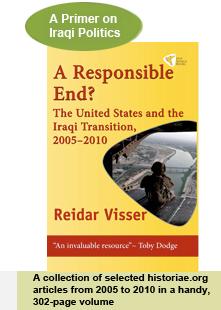 | |
| amazon.com |
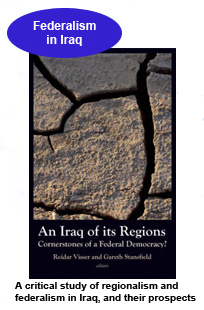
|
|
|
amazon.com
amazon.co.uk |
|
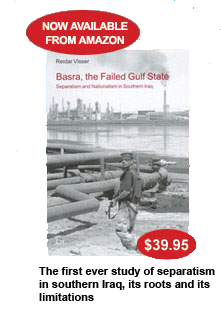
|
|
|
amazon.com
amazon.co.uk |
|
The Basra Federalism Initiative Enters Stage Two
By Reidar Visser (www.historiae.org)
15 December 2008
Today is the scheduled start date for the second phase of the Basra federalism initiative that was launched in November and that aims at transforming the Basra governorate into a federal region with a legal status similar to Kurdistan. During the course of the next thirty days, the supporters of the project need to obtain 140, 939 signatures (one tenth of the Basra electorate) in favour of their scheme before they are allowed to hold a referendum. Shortly after 14 January 2009 (and shortly before the 31 January local elections) the result will be made public, and, if the initiative is successful, a referendum could be held as early as in February, depending on legal interpretations.
Since the scheme was formally launched last month, there have been certain important clarifications about its aims. In particular, Wail Abd al-Latif, the chief pro-federal architect, has commented on oil and Basra’s claims to it. This is significant because Basra holds more oil than any other governorate in Iraq, with some estimates suggesting over 60 per cent of the total resources of the country. According to Abd al-Latif’s most recent statements, the federalists do not seek to interfere with the central government when it comes to the administration of the oil sector and the signing of contracts. At the same time, though, Abd al-Latif has hinted at demands for a special share for Basra of the oil income generated locally. This is mostly consistent with proposals for constitutional revision which he presented back in 2005, and also echoes ideas put forward by his ally in the federalism question – the Fadila party – which last year came up with the idea of a one-dollar deduction from each barrel of oil from Basra to be placed in a special development fund for the area. The approach is also consistent with some of Abd al-Latif’s negative comments on the Kurdistan Regional Government, whose independent-mindedness when it comes to signing contracts with foreign companies he has criticised for being “confederalist” rather than “federalist”.
Another important aspect of the Basra initiative concerns its underlying principles. Today, the proponents of the Basra region are explicitly framing it as a counterpoise to more sectarian schemes, like the project by the Islamic Supreme Council of Iraq (ISCI) to create a Shiite-dominated nine-governorate federal region from Basra to south of Baghdad. The Basra federalists claim that ISCI’s scheme will lead to the partition of Iraq due to its emphasis on sectarian fault lines (and will also lead to renewed problems of centralism, this time with Najaf as capital), whereas their own project supposedly will have the opposite effect and will unify the country as an Iraqi microcosm (Basra, whilst Shiite-majority, has important Sunni, Christian and Sabaean minorities, and secular groups are stronger here than in many other cities south of Baghdad). Moreover, they present their project as an attempt to stop the advance of Iranian influence in southern Iraq, which they say will grow enormously should ISCI’s scheme be turned into reality.
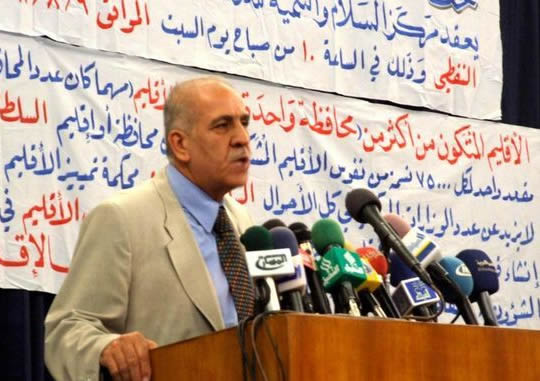
Wail Abd al-Latif during a pro-federal conference
It is aspects like these that have led some Iraqi nationalists to see the Basra scheme as less objectionable than Abd al-Aziz al-Hakim’s ideas of a big Shiite region. Nevertheless, many Iraqis, including people in Basra, do not see the point in having any federal subdivisions south of Kurdistan. Some of them are convinced that Kuwait is behind the federal initiative in Basra, citing the close family ties between Basra and Kuwait (Kuwait is just over 100 kilometres from Basra), and the fact that there are many business and property links between the two. It is true that Kuwait is the only Arab country to have flirted with the idea of encouraging devolution in Iraq previously, notably in the years following the 1990 invasion. Also, there is no doubt that both Wail Abd al-Latif and Basra leaders of the Fadila party such as the governor, Muhammad al-Waili, enjoy good relations with Kuwait, which they visit frequently. Perhaps the biggest problem with the conspiracy theories is that it becomes difficult to understand exactly where they end. Perhaps Kuwait would be able to co-opt a few leading local politicians. But can the entire Fadila party, including its spiritual leader Muhammad al-Yaqubi, really be reduced to a Kuwaiti conspiracy? It seems more realistic to ascribe the Basra project to a certain Basra particularism that has been in evidence also earlier in the twentieth century. It has never trumped Iraqi nationalism, but it has always dominated over Shiite sectarian separatism, and it has its roots in a feeling among Basrawis that they do not quite get the attention they deserve within the Iraqi framework that they subscribe to as their preferred option.
The second source of opposition to the Basra scheme emanates from those Shiites that dominate the central government in Baghdad. In line with his increasing emphasis on the virtues of centralism as a principle of government, Prime Minister Nuri al-Maliki is probably against the scheme and people close to him (like Sami al-Askari) have warned against an early referendum and have done so in a way that seems other than impartial. Then there is ISCI, which probably still favours the larger Shiite sectarian scheme, even if its pro-federal propaganda has been less in evidence in the public sphere in 2008. It is rumoured that ISCI is considering supporting anything that could create obstacles for the Basra federalists, including a competing scheme for a tri-governorate “Region of the South” (Basra, Maysan, Dhi Qar – sometimes Muthanna is added), even if this project, too, in the past has attracted many southern critics of ISCI.
Linked to the issue of competing schemes, there has been a degree of uncertainty concerning a number of prominent Basrawis who in the past have wavered between support for Basra as a standalone federal entity and the slightly larger tri-governorate project. (Few in Basra appear to show any enthusiasm for ISCI’s ideas about a nine-governorate Shiite sectarian region from Basra to south of Baghdad and a local ISCI member lately even gave some positive comments on the Basra scheme to the press.) Whereas certain tribal leaders and businessmen connected to the Shaykhi community (a Shiite sub-sect) have voiced support for a new pro-federal (uni-governorate) party headed by Amir al-Faiz, the stances of Baqir Yasin (another secularist who was for Iqlim al-Janub in 2005), Tawfiq al-Abbadi (a leading businessman) and Rashash al-Imara (a politician and leading member of the Rabia tribal confederation) still remain somewhat unclear. For example, the newspaper published by Imara has so far yet to embark on a major pro-federal campaign, and all its symbolism remains pan-Iraqi. This despite rumours of a pro-federal electoral alliance linking Faiz, Abbadi and Imara together.
These ambiguities notwtihstanding, the proponents of the federalism initiative certainly do not lack self-confidence. As early as July this year, Waili, the governor, said he believed the people of Basra supported the federalism bid, and in September he spoke of a “majority of Basra’s citizens” being in favour. Wail Abd al-Latif has similarly referred to the project as one that enjoys “mass appeal”. What is clear is that if the initiative fails, both Abd al-Latif and Fadila will receive something of a knock-out only days before the local elections, and it seems likely that they must have thought through this aspect very carefully before launching the campaign to obtain the required signatures.
There are however several factors that could impede the amassment of signatures in favour of the scheme. This is not a ballot process but a mega petition. That means that voters who approve of the project must make their way to one of 34 polling centres across Basra to record their support; opponents just need to sit and wait. Voting is not secret, and the prospect for intimidation is considerable. The second problem concerns legal ambiguities. The law on implementing federalism that was adopted in October 2006 does not provide exact timelines for how to deal with multiple federal initiatives, except that a pre-referendum poll (istibyan) will be held to decide which of them is to be put to a referendum, "within two months of the presentation of the petitions". But if this means "the last petition presented", the process could last for a very long time! For example, if in late January, after a hypothetical passage of the second stage of the Basra initiative, 60,000 signatures in favour of a tri-governorate federal region covering Basra, Maysan and Dhi Qar were presented, it is unclear whether that could have halted the process towards a referendum and, if so, for how long. Is there no time limit with regard to when a third or even fourth initiative can materialize? There is a requirement for a referendum to be held “within three months” after a federal initiative has been recognised by the Iraqi electoral commission and hence entered stage one (this would be from November 2008 to February 2009 in the case of Basra’s current initiative), but no timeline for more complicated, multi-initiative scenarios appears to exist.
It should be added here that the Basra petitioners are following the hard route to federalism, probably trying to forestall moves by ISCI to create a far bigger region via the easy procedure: calling a referendum after a request by a mere third of the members of the governorate council. However, the 2006 legislation explicitly relates this option to governorate councils “created under the constitution”, hence many argue that it is valid only after 31 January 2009 when new councils will replace the pre-constitution ones elected in January 2005. But, if a Basra region has already been created, it will be exceedingly difficult for ISCI to create a nine-governorate region because according to the federalism law, already-existing federal regions can only grow by one governorate at a time and cannot join with other regions (the latter option was deleted from the second draft of the 2006 law). Thus in some ways, this looks like a last-ditch attempt by leaders in Basra to challenge the Shiite establishment in Baghdad before it is too late. The Maliki government resisted the 2009 provincial elections as long as they possibly could, and when they finally agreed to them they were given considerable backing by the multinational forces in dealing with enemies south of Baghdad loosely described as “terrorists”. They have also managed to get agreement for an unconditional handover to Iraqi control in all population centres by next summer (i.e. no political reform required), giving them ample opportunity to manipulate the next parliamentary elections scheduled for December 2009. People across Iraq fear that Iranian influence will continue to grow if the Americans withdraw without any changes to the basic system of government in Iraq coming into effect. The Basra initiative could be one possible counter-offensive, albeit a controversial one that is resisted by many Iraqis and Basrawis who share the same fear of Iranian dominance.
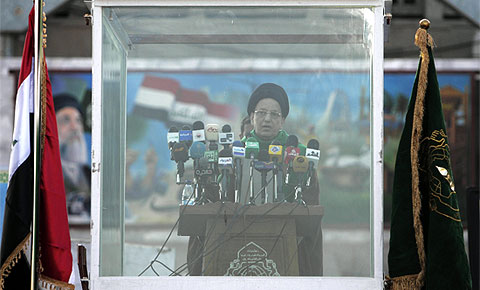
An ailing Abd al-Aziz al-Hakim behind bulletproof glass during the recent Eid festivities. Hakim has been the pillar of US policy in Iraq south of Baghdad at least since 2005
Finally, it cannot escape notice that in the world of conspiracy theories, the battle over some of the world’s largest oil reserves is currently seen as a struggle between Iranian and Kuwaiti intelligence services, while the occupying powers in Iraq, including the oil-thirsty United States, are perceived to be sitting idly by, locked in their marriage to ISCI (whose influence in Basra is far less than in the oil-deficient parts of Iraq south of Baghdad). Whatever the truth is with regard to the Kuwait link, President George W. Bush certainly did not hesitate in highlighting the stale and static character of US policy in Iraq during his visit to Baghdad yesterday. Once more, in addition to meeting with Maliki and the members of the Iraqi presidency, he held talks with Masud Barzani (the president of the Kurdish region) and Abd al-Aziz al-Hakim of ISCI. None of these figures is particularly popular in the oil-rich Basra which presumably is centre-stage in US strategic calculations in the region.
Also on this topic:
Suffering, Oil, and Ideals of Coexistence: Non-Sectarian Federal Trends in the Far South of Iraq
Iraq Federalism Bill Adopted Amid Protests and Joint Shiite–Sunni Boycott
The Draft Law for the Formation of Regions: A Recipe for Permanent Instability in Iraq?
Copyright © 2005-2008 historiae.org & Reidar Visser
This document or quotes from it may be freely reproduced as long as www.historiae.org is credited as the original source.
